Are you looking for a simple, effective, natural all-purpose cleaner to clean your home? If so, this recipe is for you! All you need is 2 ingredients and 2 minutes.
I’ll show you how to make the best all purpose cleaner recipes using vinegar or castile soap! Made with simple ingredients that are cheap and easy to find. With fantastic cleaning power, these natural cleaners will clean your whole house, from living room surfaces to the bathroom sink and tub to door handles.
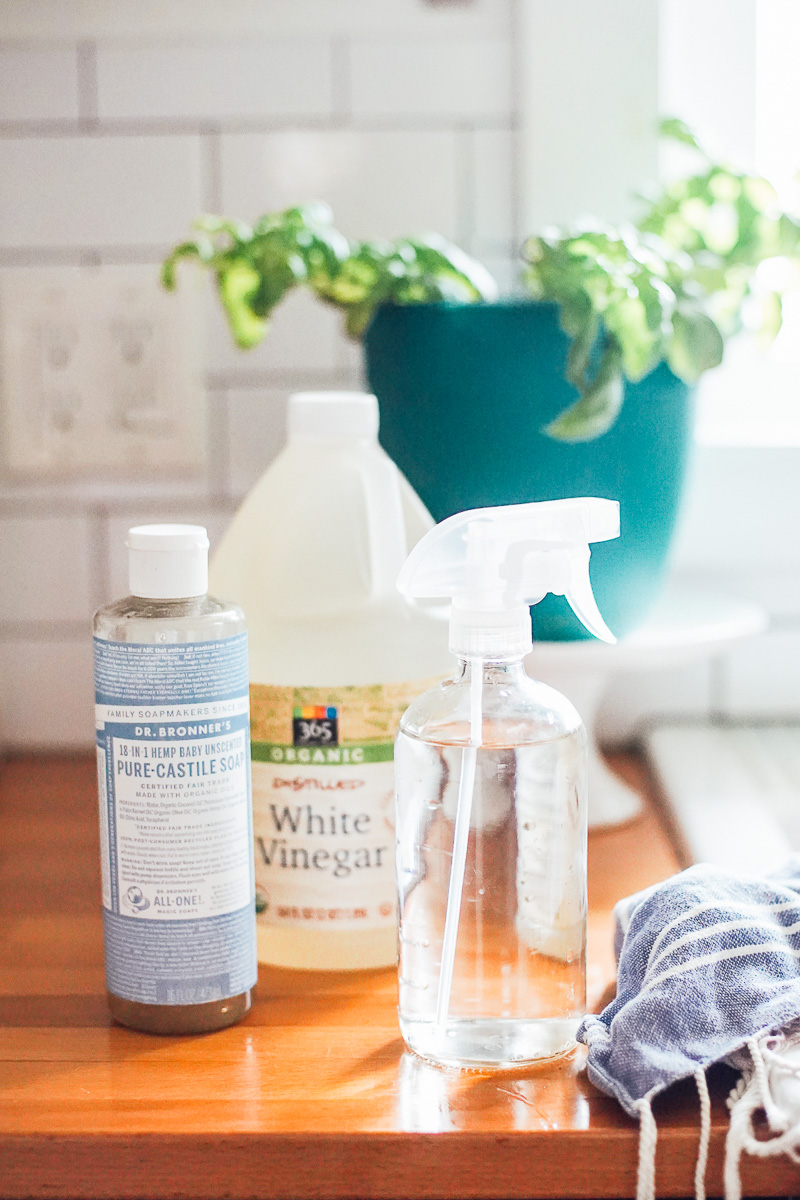
Want to Save This Article?
Enter your email & I’ll send it straight to your inbox. And you’ll get new recipes & tips each week.
Key Takeaways
- Two Ways – Below, you’ll find two recipes for all-purpose surface spray!
- Essential Oils – If you prefer a scented spray, add your favorite essential oil to the spray, like lemon or peppermint essential oil.
- Multi-Purpose Cleaning – Use this spray to clean almost any surface in your home. I’ll give you all the details below.
- Storage – Store this recipe for up to 1 month.
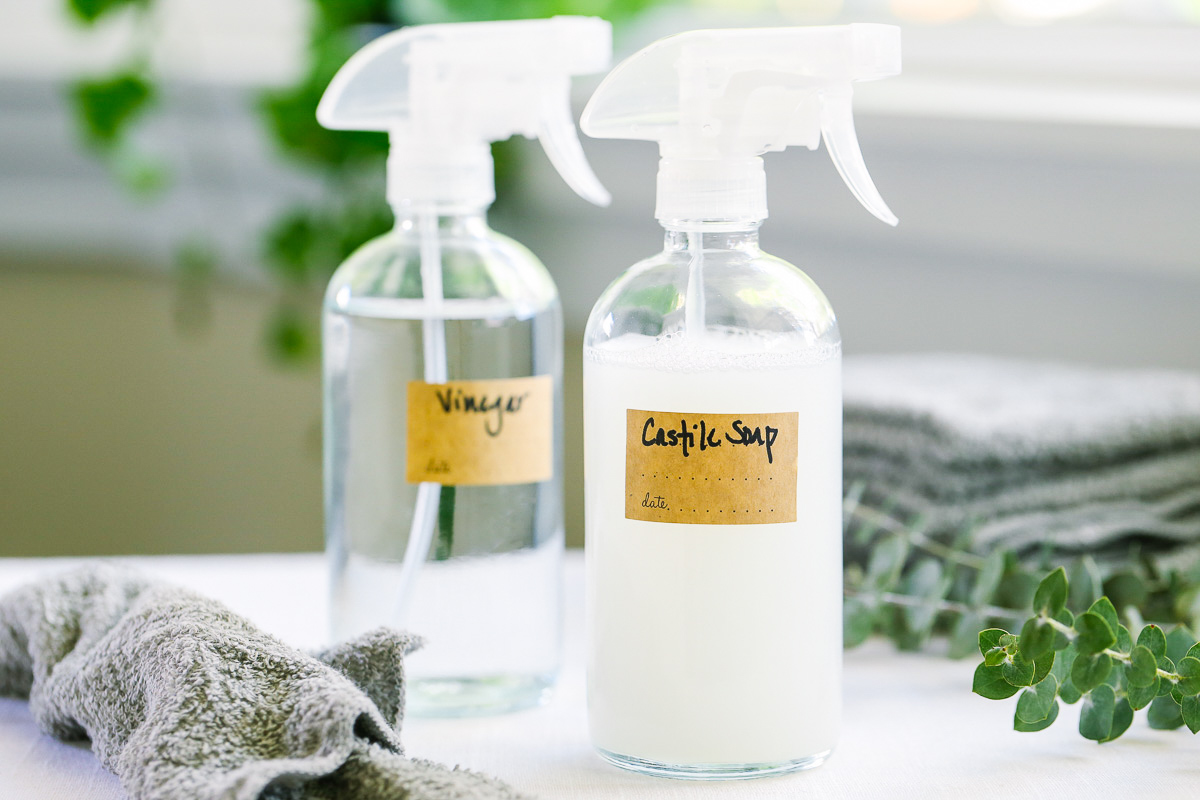
Before You Get Started: What You’ll Need
- To make these recipes, you’ll need either liquid castile soap OR white vinegar and distilled water. You’ll find all of these ingredients in the grocery store.
- You’ll also need a 16-ounce spray bottle. Glass or plastic both work.
How to Make DIY All Purpose Cleaner: Step-By Step Guide
These recipes are wonderful natural cleaning solutions and are far cheaper than any store-bought cleaners. Here are the two best ways to make an all purpose cleaner without harmful chemicals…
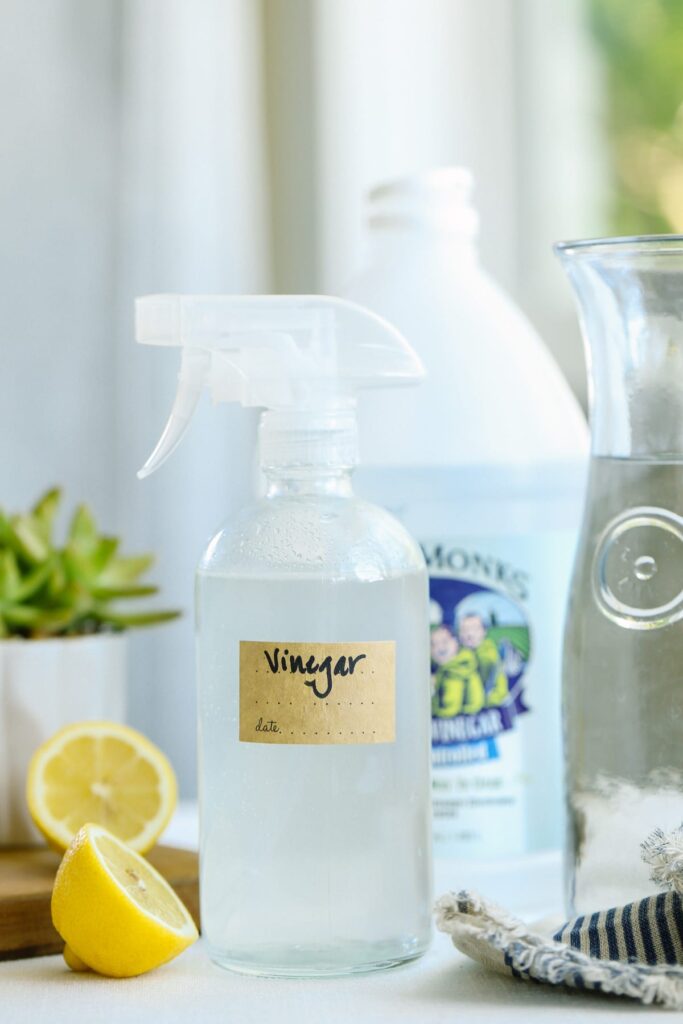
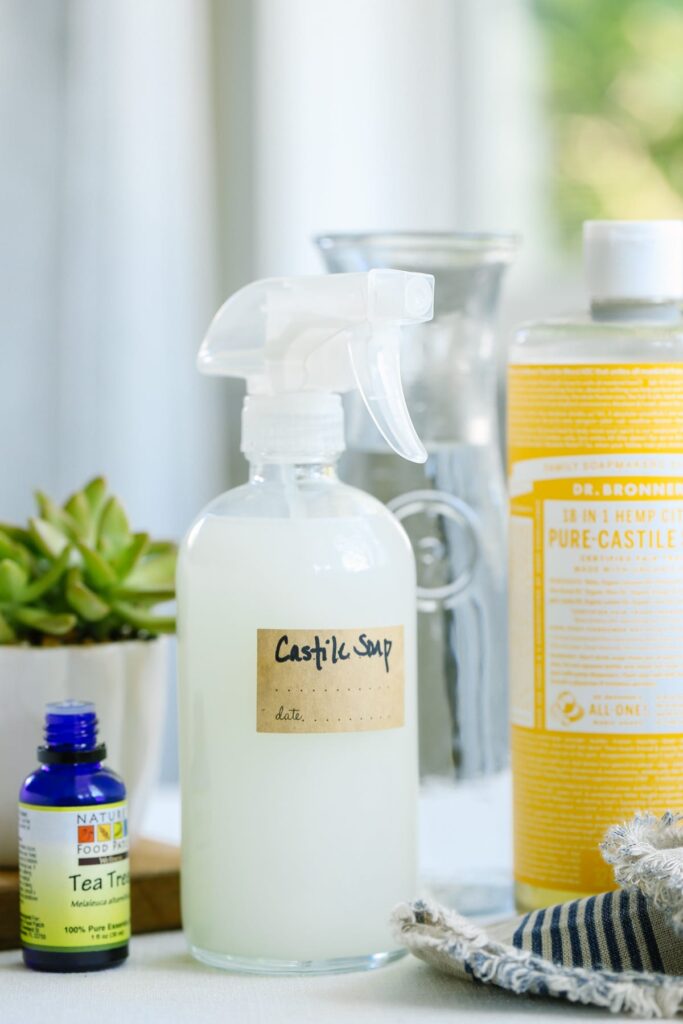
Recipe 1: Vinegar All-Purpose Spray
- 1 16-ounce glass spray bottle
- 1 cup distilled white vinegar or homemade orange peel vinegar (vinegar infused with orange or lemon peels)
- 1 cup distilled water (water with impurities removed; found at any grocery store)
- Optional: 1 teaspoon Sal Suds (a detergent-based soap that may be mixed with vinegar and is tough on dirt, grease, and soap scum)
- Optional: 15-30 drops of your favorite essential oil
Instructions
- Add the vinegar, water, and Sal Suds or essential oil (if using) to the spray bottle.
- Place the spray nozzle on the bottle and gently shake the bottle to combine the ingredients. You’ll want to do this each time you use the cleaner.
- Spray the surface directly, then use a cloth to wipe and clean the surface.
White Vinegar
Found at any grocery store. White vinegar is 5% acetic acid. The acid fights against bacteria. Vinegar can’t be used on every surface (like marble and granite). Even with these limitations, vinegar is an extremely versatile product that can be used to clean a variety of surfaces. Make it extra special and use orange or lemon rinds to create a citrus-scented vinegar for cleaning.
Recipe 2: Castile Soap All-Purpose Spray
- 1 16-ounce glass spray bottle
- 2 cups distilled water (water with impurities removed; found at any grocery store)
- 2 tablespoons scented or unscented liquid castile soap OR 1 teaspoon Sal Suds (a detergent-based soap that’s tougher than castile soap)
- Optional: 15-30 drops of your favorite essential oil
Instructions
- Add the water to the spray bottle, followed by the castile soap (or Sal Suds), and (if using) essential oil of choice.
- Place the spray nozzle on the bottle and gently shake the bottle to combine the ingredients. You’ll want to do this each time you use the cleaner, particularly if it’s been sitting and the ingredients have settled or separated.
Castile Soap 101
An ancient soap made from natural ingredients and comes from the Castile region of Spain, giving it its name. This soap doesn’t contain any animal fats or synthetic ingredients (including synthetic preservatives and fragrances). It’s made in two forms: liquid soap and bar soap. For this recipe, use liquid soap.
Step-By-Step Recipe Video
Which recipe should I make?
That comes down to preference and also what you’re cleaning. Some things to consider…
- Make the castile soap all purpose cleaner if cleaning sensitive stone surfaces, such as granite or marble. Do not use vinegar on these surfaces.
- Make the castile soap cleaner if you hate the smell of vinegar.
- Make the vinegar cleaner if you don’t mind the scent of vinegar.
- Make the vinegar cleaner if you want a solution that also cleans glass, mirrors, and windows.
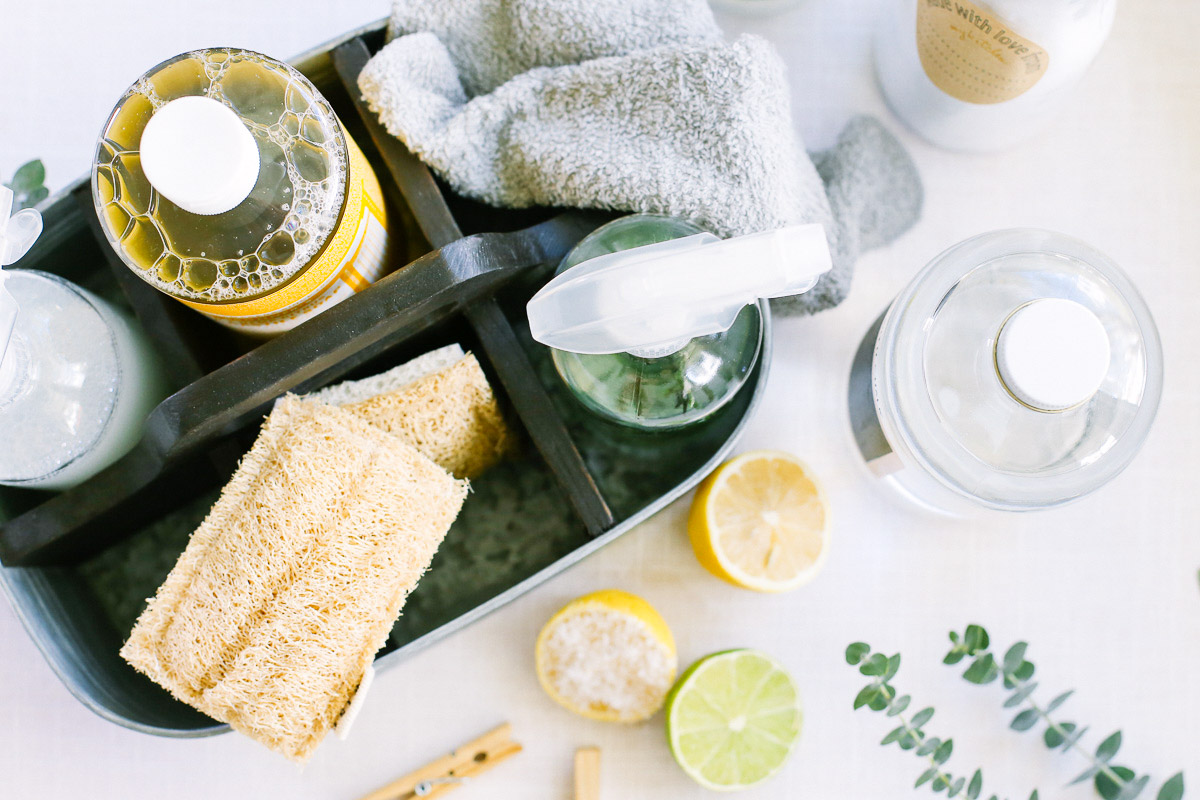
Want to add an essential oil? The best options
Essential oils are NOT required ingredients to make effective homemade cleaners, but they can add a lovely scent and beneficial properties.
You’re welcome to add an essential to either all purpose cleaner recipe. Here are a few of my favorites.
- Tea Tree Oil: Known for its antibacterial properties, tea tree essential oil is commonly used to make natural cleaning products.
- Peppermint: Adds a fresh, vibrant, minty scent.
- Lavender: Adds a calming scent.
- Orange or Lemon: A fresh, citrusy scent.
- Germ Fighter Blend: This is a blend of individual essential oils. Each brand has its own name for this blend, some call it Thieves Oil, while others call it Germ Fighter. Usually a blend of lemon, cinnamon, eucalyptus, clove, and rosemary essential oils.
What is an essential oil?
Essential oils are concentrated oils derived from plants. For those wanting a more scientific definition, here’s how Retha, a certified aromatherapist from Plant Therapy, defines an essential oil, “An essential oil is a concentrated hydrophobic liquid containing volatile aroma compounds from plants. Essential oils are generally extracted by distillation, often by using steam.
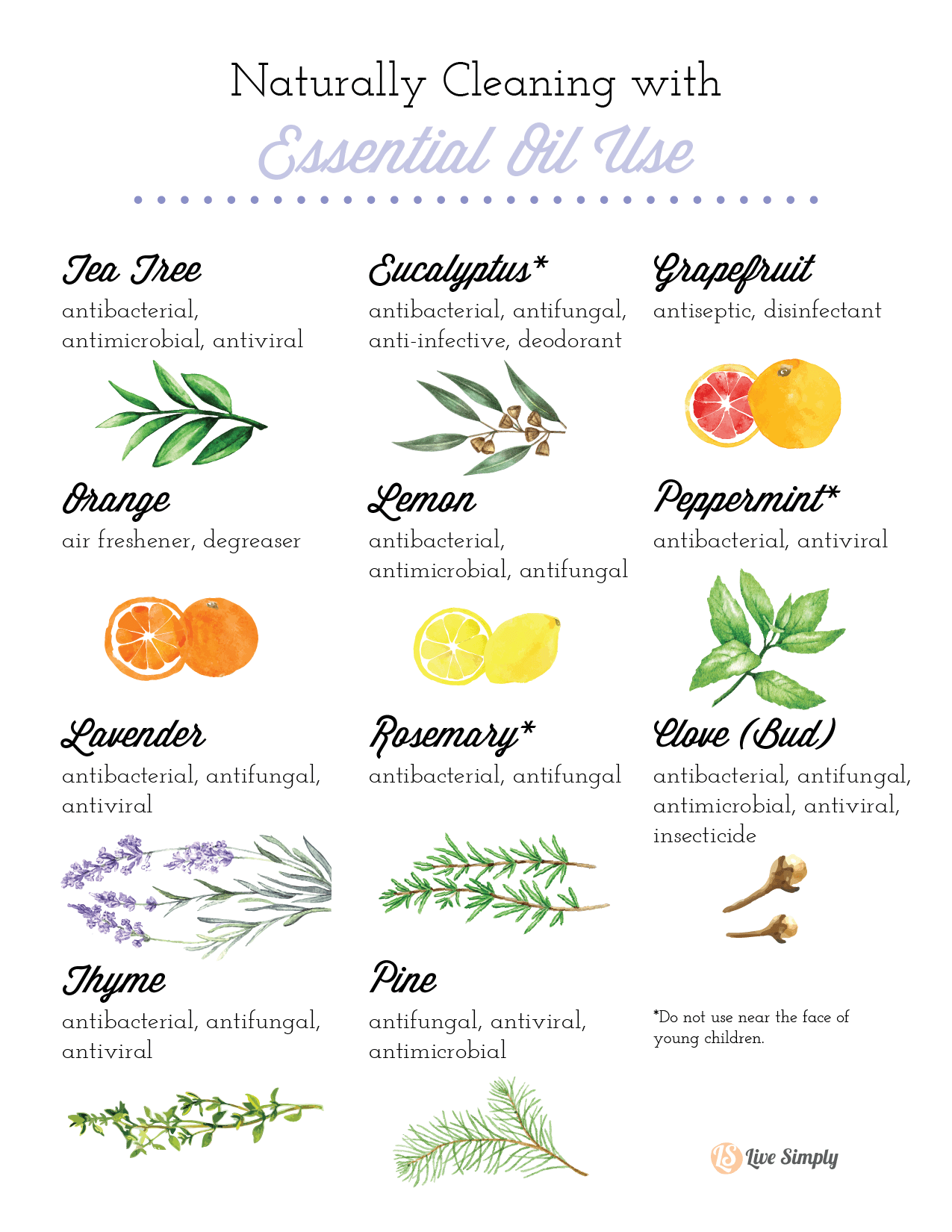
What to Avoid Doing
- Vinegar on Stone – Don’t use a vinegar-based cleaner on granite or marble. The acid can wear away at the stone. Instead, use the castile soap cleaner.
- Mix Vinegar & Castile Soap – I know, it’s a popular combo on Pinterest. But the two ingredients should never be combined in one bottle to make a cleaner. The result will be an oily mess. Read more about why this happens.
- Add More Castile Soap Than Recommended – More is not always better. When making the castile soap surface spray, stick with 2 tablespoons of soap. Castile soap is highly concentrated so a tiny amount goes a long way. Adding more will only result in a white residue left on surfaces.
- Essential Oils – Always be cautious when adding essential oils to DIY cleaners, particularly when young children or pets are in the home. Some essentials oils may be toxic or harmful to pets and young kids. There are many lists online that breakdown safe and unsafe oils to use in these situations.
How to Use Homemade All Purpose Spray
Use either of these natural cleaning recipes just like any commercial cleaner.
- First, spray the surface directly with cleaner of choice.
- Next, use a cloth or paper towel to wipe the surface clean (or a toilet brush for the toilet).
- If you’re using the castile soap cleaner, go back over the surface with a damp cloth, rinse and repeat.
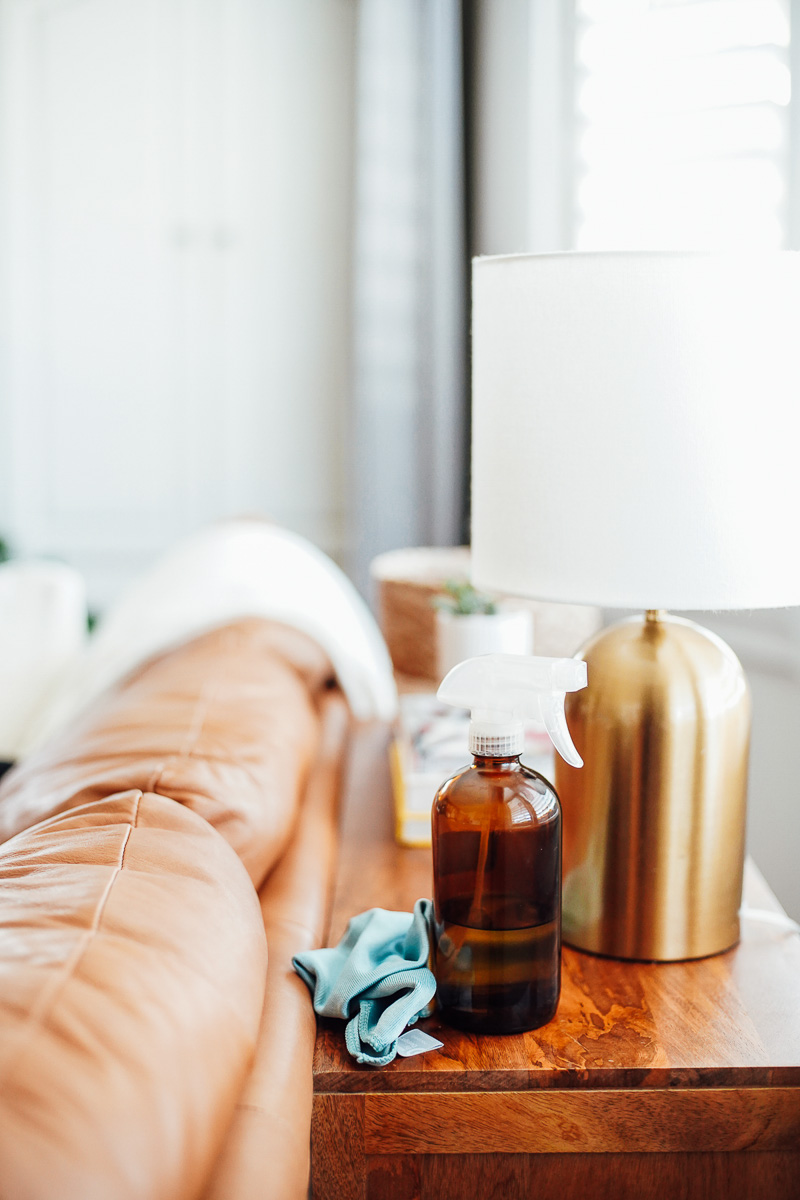
What surfaces can I clean?
Before using a cleaner on household surfaces, always spot test first before liberally spraying any hard surface. Here are a few of my favorite ways to use an all purpose cleaner.
- kitchen surfaces: sink, cooktop, oven, counter tops, (do not use vinegar-based cleaners on marble or granite), inside the fridge, tile and grout
- bathroom surfaces: sink, tubs, counter tops (do not use vinegar-based cleaners on marble or granite), tile and grout
- kitchen table and chairs
- toilets
- dusting surfaces (I recommend using a microfiber cloth)
- dirty toys
- door knobs
- lightswitches
- stainless steel surfaces
- interior car surfaces
- glass and mirrors (only the vinegar cleaner; the castile soap cleaner will leave streaks OR make your own glass cleaner with rubbing alcohol and vinegar)
FAQs
- Can I leave out the essential oil from the Castile soap recipe? Yes, you can skip the essential oil in either recipe. You’ll still make a fantastic cleaner without it!
- Can I use filtered water instead of distilled water? When making homemade products, filtered water may be used for temporary solutions, but for longer-term storage, use distilled water (found in any grocery store) or boiled water (boil for 15 minutes, then cool) to limit the possibility of bacterial growth.
- Are plastic spray bottles okay to use as well as glass? Yes, you can use either plastic or glass spray bottles.
- Have you ever used the all-purpose surface cleaner with castile soap on wooden surfaces such as the kitchen table? Yes! I use this cleaner on many of the wood surfaces in our home without issue. Always spot-test a small area before applying any cleaner on a surface.
- Could I use alcohol or Vodka instead of distilled water? That way, it would last longer & have more germ-killing power. Yes, you could make this substitute.
- How do I prevent the castile soap cleaner from leaving a white residue on surfaces? This issue can occur when castile soap is mixed with hard water. Using distilled water to make the recipe should help. But if this problem is still happening, wipe the surface with a wet cloth, rinse, and repeat until the white residue is gone.
Learn how to make natural cleaners for your home
Best Natural Cleaning Recipes to Make Next
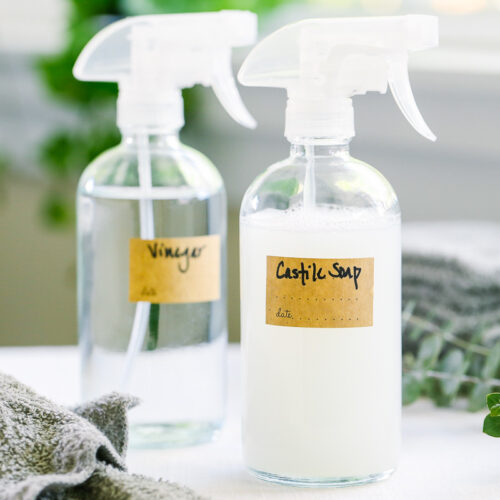
DIY Homemade All-Purpose Surface Cleaner: Two Ways
Equipment
Ingredients
Castile Soap All Purpose Surface Cleaner
- 2 cups distilled water
- 2 TB liquid castile soap (scented or unscented) OR 1 teaspoon Sal Suds
- 15-30 drops essential oil of choice (optional) lavender, peppermint, orange, or lemon, etc.
Vinegar All Purpose Surface Cleaner
- 1 cup distilled water
- 1 cup white distilled vinegar
- 15-30 drops essential oil of choice (optional) lavender, peppermint, orange, or lemon, etc.
- 1 teaspoon Sal Suds (optional) for cleaning grease, picking up dirt on surface
Instructions
Castile Soap All Purpose Surface Cleaner
- Pour the water into a 16-ounce spray bottle (use a funnel, if needed). Add the castile soap and essential oil. Gently shake the solution to combine. Store at room temperature for up to 4 weeks.
Vinegar All Purpose Surface Cleaner
- Pour all the ingredients (vinegar, water, and if using Sal Suds or essential oil) into a 16-ounce spray bottle (use a funnel, if needed). Shake the solution to combine. Store at room temperature for up to 4 weeks.
- How to Use
- Gently shake the spray bottle before spraying the cleaner on the desired surface. Spray the cleaner and wipe off the surface with a damp cloth (this is important when using the castile soap cleaner since it can leave a soapy residue if left to dry)! Do NOT use the vinegar cleaner on marble or granite.

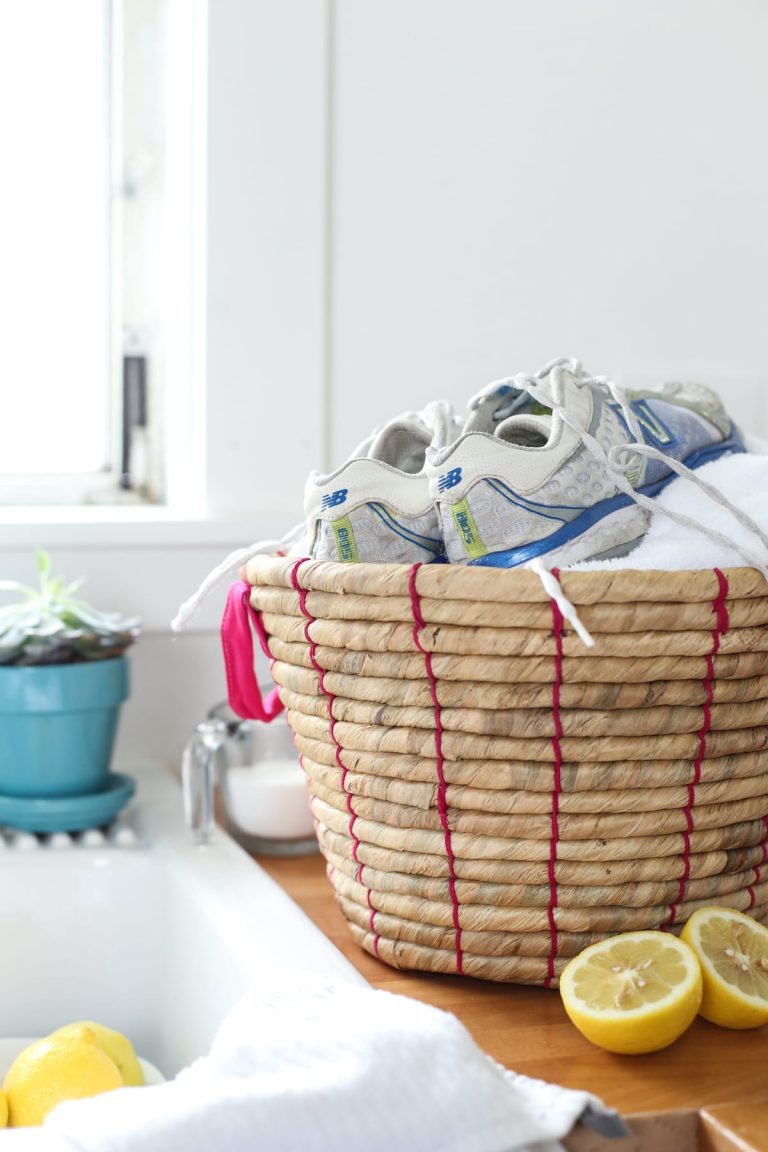
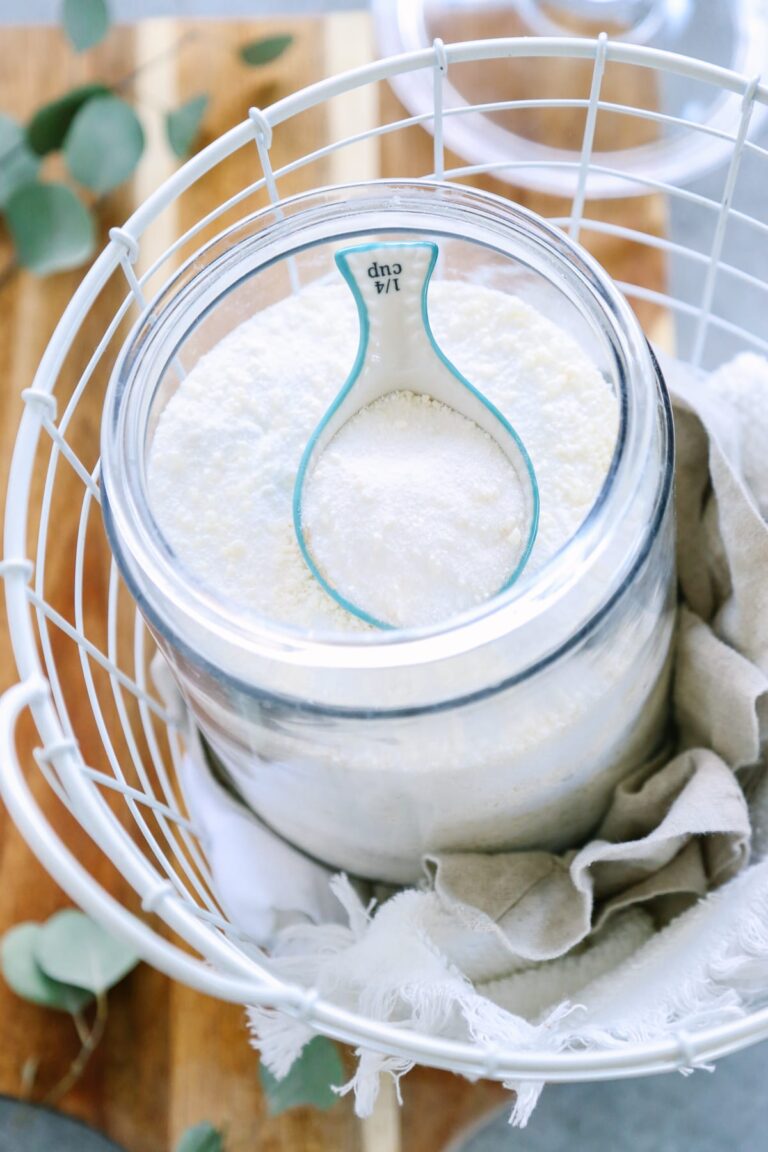
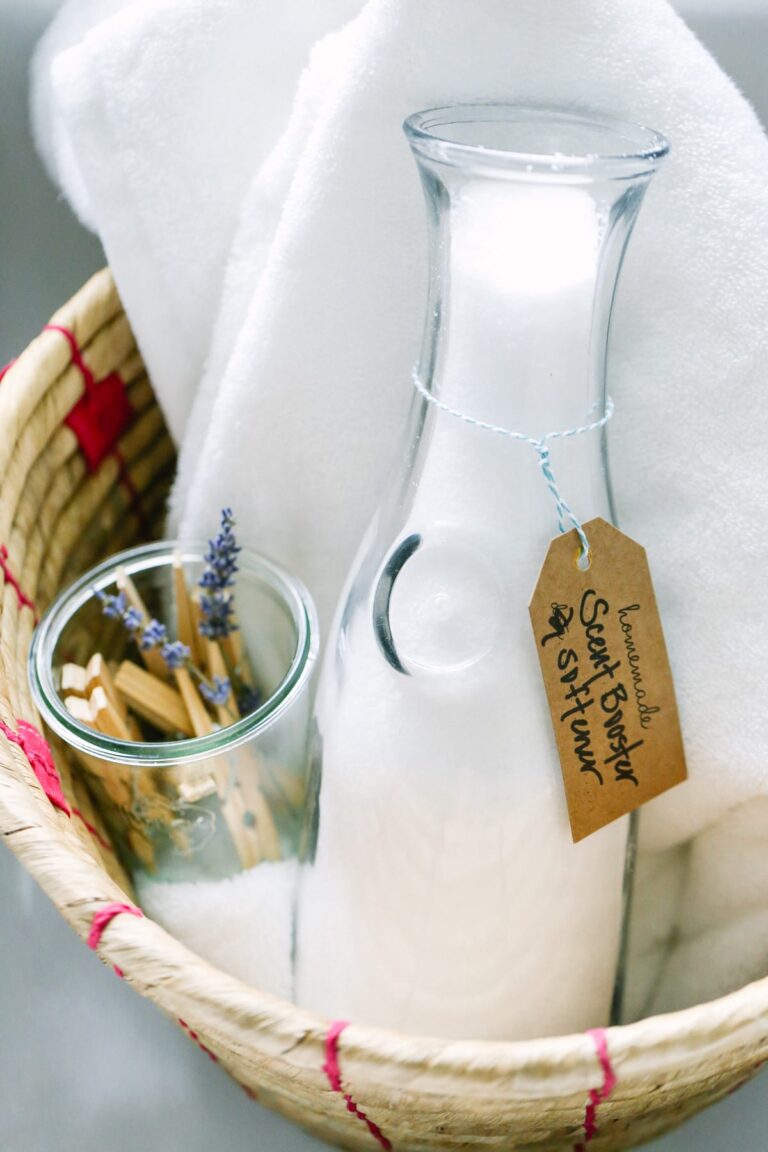
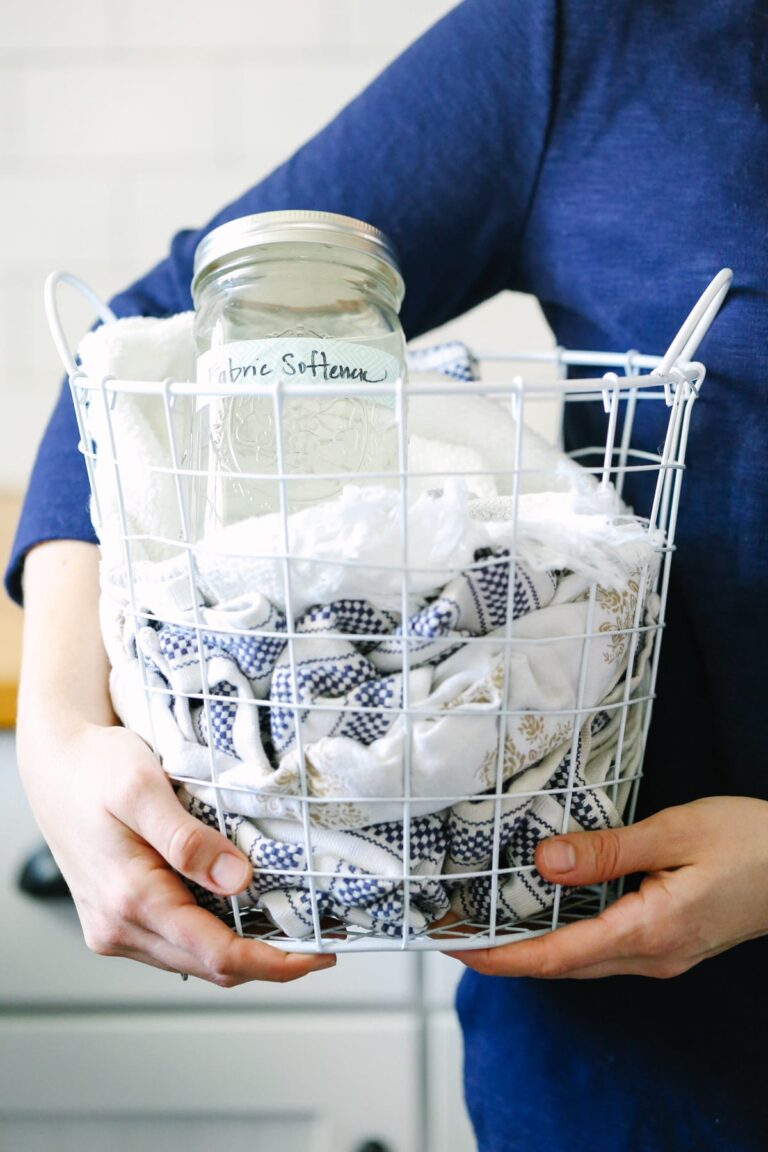
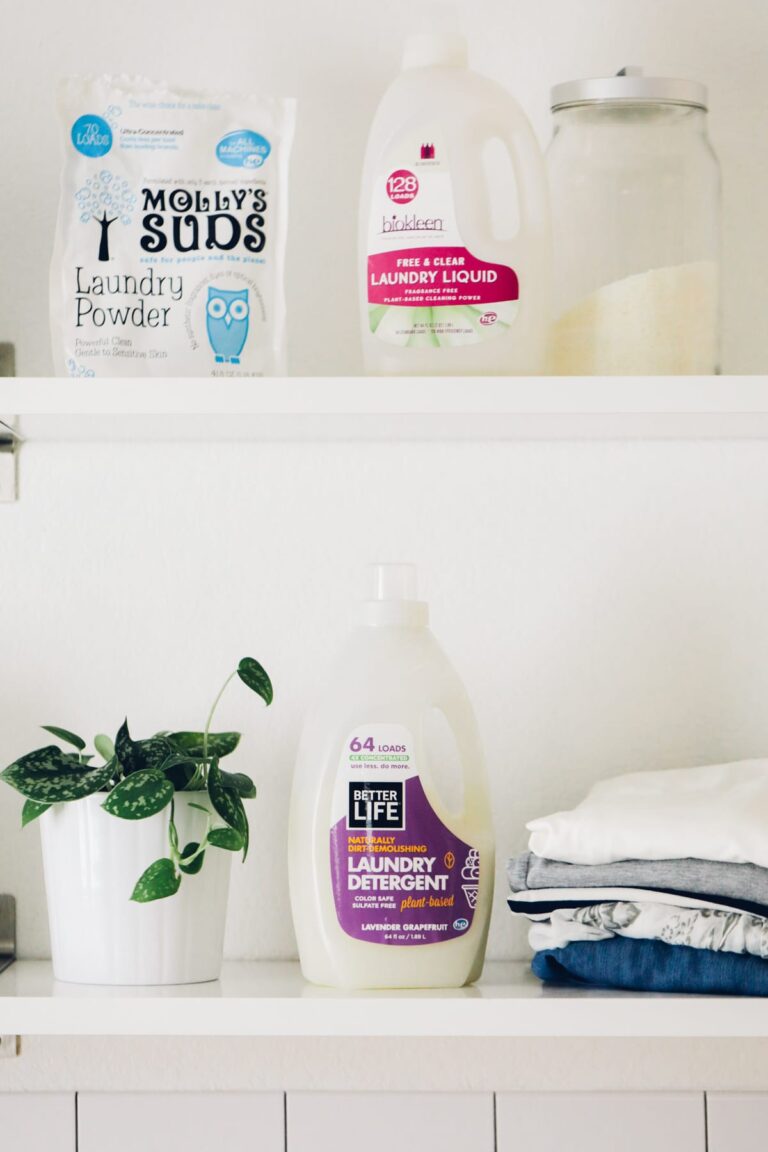
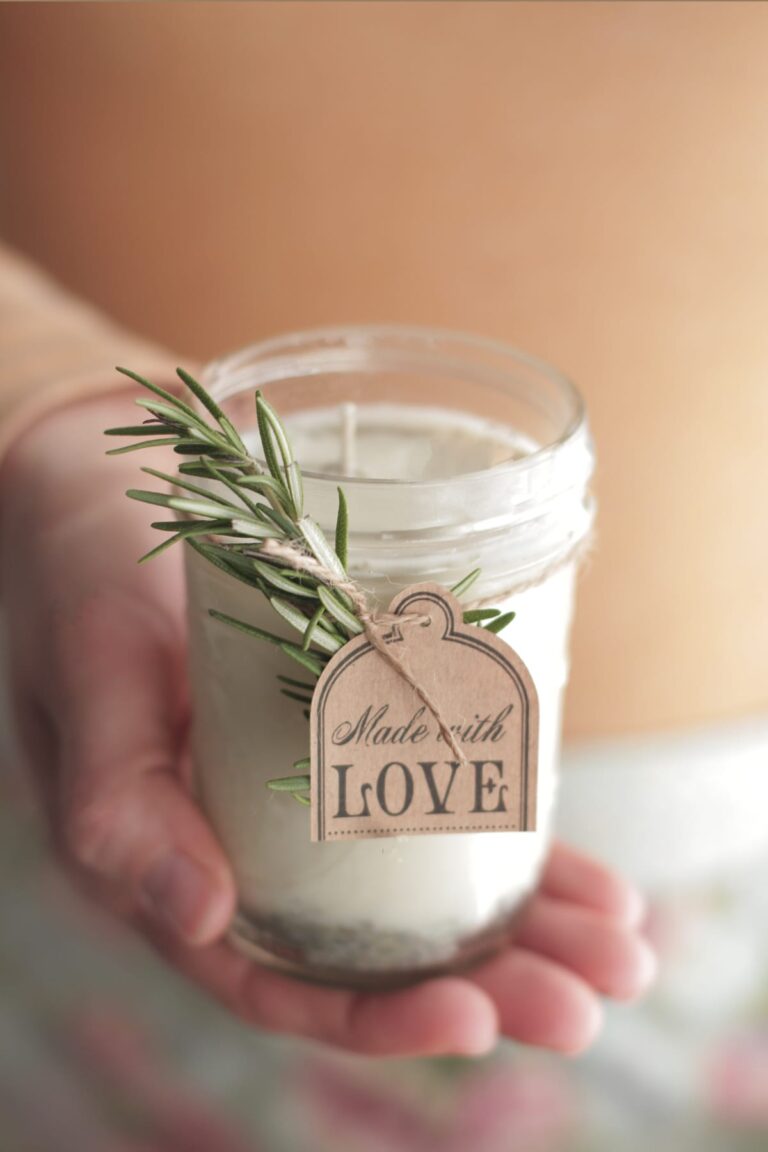
Hello, when making this formula does preservatives need to be added to prevent mold, if it isn’t used right away?
Hey Dee, You’re welcome to add a preservative; however, if you use distilled water you shouldn’t need one. Just use the formula within a month to be safe.
Can I leave put essential oil from the Castile soap recipe?
Hey Sarah, Yes, you can. You can skip the essential oil in any cleaning recipe here on the blog with the exception of the stain remover spray.
I never knew
Glad the recipe was helpful :).
I have used the “Castile Soap Surface Cleaner” for a year or so. While it is effective, it is also frustrating to use. No matter how often I shake it, the soap seems to settle at the bottom so once the spray bottle is 1/3 full or less, the solution is MUCH soapier. I only use 2T of Castille soap, so that shouldn’t be a problem. I had this same problem with another soap-based AP I used. I may try just 1T or go back to my old AP cleaner.
Yes, try reducing the amount used or use Sal Suds (just a teaspoon or so)
Its really helpful information. Thank you
I am used to cleaning with a bucket of water that I dump a bit of a cleaning solution into and a soft cloth. Can I do this instead of making a spray?
This is my go to multi cleaner in my home! It works wonderfully!
This is my go to cleaner in my home! I absolutely love it, it works so well!
I love making my own cleaners and these recipes are great! I’ve noticed however that a a few weeks after making them, the one with lemon essential oil is now sort of cloudy and it was originally clear. Is it growing mold or is this normal? It’s in an amber colored glass bottle so it’s sort of hard for me to see what is happening. It still smells great, so I’m very confused.
Hey Jo, Did you use distilled water? If so, it could just be the essential oil making the blend cloudy, or another ingredient (castile soap will do this). If not, I would play it safe and toss the cleaner.
I used bottled water for one of them, ironically the one with the castile soap, and the other I made the next day and just used tap water (completely forgot about using distilled). But basically, if the mixture starts clear – it should remain clear right? I think I will be tossing the cloudy, non-castile one.
Thank you!
Hi, I am looking to make my own cleaning products. I was wondering if you can use filtered water instead of distilled water? Thanks 🙂
Hey Becky, Yes, you can. It will just need to be used faster.
Hi, Kristin! Loved the castile cleaner recipe! Are plastic spray bottles okay to use as well?
Hi Kristin ~ . I love your website! I was looking for a cleaner to use on my computer screen. Would you use your glass cleaner to clean the computer screens?
Thanks in advance.
Heather
Hey Heather, I do! The recipe is in my cleaning book: 3 tablespoons distilled water (to prevent mineral deposits caused by tap water)+ 3 tablespoons rubbing alcohol. Add the ingredients to a spray bottle and shake to combine. Spray the electronics cleaner on a microfiber cloth. Wipe electronic screens. Always test a small area first.
I’m so glad you’re enjoying the blog!